|
|
|
Sort Order |
|
|
|
Items / Page
|
|
|
|
|
|
|
| Srl | Item |
| 1 |
ID:
169201
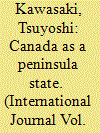

|
|
|
|
|
| Summary/Abstract |
An unprecedented geopolitical landscape, driven by the reduction of Arctic ice and the rise of China as “a Polar power,” is emerging. What does this mean for Canada, and how should Canada respond to it in a systematic and strategic manner? We need a coherent and holistic conceptual framework to answer these key policy questions. Yet, the current literatures do not offer us such a concept. In an attempt to fill the void, this article presents a vision that conceives of Canada as “a peninsula state” exposed to great power politics in its vicinity, involving China as a rising power as well as the United States and Russia as resident powers. Furthermore, it argues that Canada should be prepared for three kinds of strategic dynamics as it enters the game of great power politics: theatre-linkage tactics and wedge-driving tactics vis-à-vis China and Russia, as well as quasi-alliance dilemma with the United States. Moreover, in order for Canada to cope with this complex international environment effectively, this article calls for creating a cabinet-level unit to coordinate various federal bureaucracies’ foreign and security policies.
|
|
|
|
|
|
|
|
|
|
|
|
|
|
|
|
| 2 |
ID:
169209
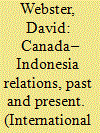

|
|
|
|
|
| Summary/Abstract |
Canada–Indonesia relations recently passed their 65th anniversary, but they still have a tentative air about them. Despite regular talk about developing a strong Canadian relationship with a country that potentially has much in common with Canada, Canada–Indonesia relations have mostly been friendly but shallow. An overview of the history of bilateral relations, from the opening of a Canadian mission in 1953 to recent bilateral deals committing Ottawa and Jakarta to various forms of collaboration, reveals that rhetoric about common interests has some substance, but a new announcement amidst good intentions every few years is not likely to lead to any deep partnership. There are, however, foundations for closer ties in civil society, including in the fields of economic development, truth and reconciliation, religious deradicalization, and Indigenous peoples linkages.
|
|
|
|
|
|
|
|
|
|
|
|
|
|
|
|
| 3 |
ID:
169202
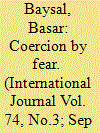

|
|
|
|
|
| Summary/Abstract |
The Iraq War was one of the most prominent events of the early 2000s. The prelude to the war halted the sense of optimism that captivated International Relations as a discipline after the end of the Cold War. The United States initiated this war following a lengthy securitization process. This study focuses on analyzing the securitization process in Iraq prior to the 2003 war. To that end, the article investigates the securitization process by asking, “How, within what context, and when did the securitization of Iraq take place?” For the study, 85 speeches made by President Bush are analyzed to examine how the president presented Iraq as an existential threat. The study also examines the kinds of arguments used by the Bush administration in securitizing Iraq. This study contributes to the literature on the 2003 Iraq War and security studies by applying Securitization Theory to the Iraq case by incorporating two essential contributions to the securitization analysis: context and audience(s).
|
|
|
|
|
|
|
|
|
|
|
|
|
|
|
|
| 4 |
ID:
169203


|
|
|
|
|
| Summary/Abstract |
Canadian foreign policy analysis has traditionally drawn heavily on the middle power concept. This paper proposes to look at Canadian foreign policy from a new angle: Using the concept of ontological security, it shows how “civilian power” elements such as multilateralism, institution building, and the rule of law, are connected to Canada’s identity and foreign policy development. The article systematically compares public statements and speeches by government officials regarding the Syrian war. The comparison is conducted against the backdrop of the governments’ foreign policy actions. On a theoretical level, the paper contributes to the discussion on Canadian identity and ontological security. Furthermore, it offers a comparison of the Syria policies of the Harper and the Trudeau governments, adding to the literature on differences and continuities between Conservative and Liberal Canadian foreign policy, as well as on empirical analyses of Canadian foreign policy and the Syrian war.
|
|
|
|
|
|
|
|
|
|
|
|
|
|
|
|
| 5 |
ID:
169206
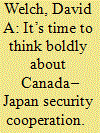

|
|
|
|
|
| Summary/Abstract |
Policy-makers, scholars, and commentators regularly remark upon the unrealized potential of Canada–Japan cooperation, but neither country has taken decisive steps to address it. This reticence is especially noticeable in the security realm. As friendly, like-minded countries with common values, a common vision of international order, and strongly shared security interests in an increasingly tumultuous world, Canada and Japan would be expected to strengthen security ties in meaningful ways. Recent (relatively minor) steps in this direction are welcome. But the time is ripe for the two countries to cement their security partnership through a series of bolder measures ultimately leading to formal alliance.
|
|
|
|
|
|
|
|
|
|
|
|
|
|
|
|
| 6 |
ID:
169205


|
|
|
|
|
| Summary/Abstract |
The Canadian Liberal government of Justin Trudeau claims to be ushering in a new era of a “feminist” foreign policy. While serious steps have been taken in this direction, this paper focuses on the government’s opposition to the Treaty on the Prohibition of Nuclear Weapons, a treaty that has been negotiated with a logic and language explicitly linking issues of disarmament and gender, reframing “security” as fundamentally a question not of state but of human (and environmental) security. Ignoring its own public statements that repeatedly link women with peace and security, the Trudeau government’s opposition to the Treaty exposes the hollowness of its claims.
|
|
|
|
|
|
|
|
|
|
|
|
|
|
|
|
| 7 |
ID:
169207
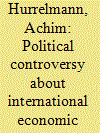

|
|
|
|
|
| Summary/Abstract |
The withdrawal of the UK from the EU, if and when it occurs, will likely imply that Canada must conclude a new bilateral trade agreement with the UK. In light of recent trends toward an increasing politicization of trade negotiations, this policy brief assesses the respects in which a Canada–UK agreement could become politically controversial. Drawing on explanations for the politicization of recent trade deals, it identifies potential flashpoints for political conflict in the Canada–UK trade relationship. It then discusses how policy-makers can channel trade-related controversies into the policy process in an inclusive and evidence-based manner.
|
|
|
|
|
|
|
|
|
|
|
|
|
|
|
|
| 8 |
ID:
169208


|
|
|
|
|
| Summary/Abstract |
Global Health Diplomacy has been instrumental in achieving many of the world’s global health goals, such as the Millennium Development Goals. The new Sustainable Development Goals are ambitious, and all tools need to be employed to make sure they are achieved by the 2030 deadline. This paper reviews the successes and failures of the health-related Millennium Development Goals. It uses the lessons learned to put forward a sustainable approach toward the Sustainable Development Goals, and explores the role of Global Health Diplomacy in advancing the health goals.
|
|
|
|
|
|
|
|
|
|
|
|
|
|
|
|
| 9 |
ID:
169204


|
|
|
|
|
| Summary/Abstract |
Canada announced its renewed commitment to United Nations peacekeeping with a special mission to increase the representation of women through the Elsie Initiative. That announcement marks a crucial time to examine peacekeeping as a gendered project that requires reflection on power and inequality between states and peacekeepers through an intersectional analysis that pays attention to gender and race. The major justification for increasing the number of women in peacekeeping operations has remained instrumental: deploying more women will lead to kinder, gentler, less abusive, and more efficient missions. However, there is little empirical evidence to support these claims. This paper looks at Canadian peacekeeping and arguments for women’s increased representation in peacekeeping operations for improved operational effectiveness as a “smart” peacekeeping strategy. It looks at the contradictions and controversies in Canadian peacekeeping and gender and smart peacekeeping that includes the Women, Peace, and Security agenda in general and within Canada, operational effectiveness claims, militarized masculinity, and militarized femininity. Without qualitative empirical data from Canadian women peacekeepers themselves, smart peacekeeping claims, which “add women and stir,” are largely anecdotal and do not adequately facilitate meaningful change.
|
|
|
|
|
|
|
|
|
|
|
|
|
|
|
|
|
|
|
|
|